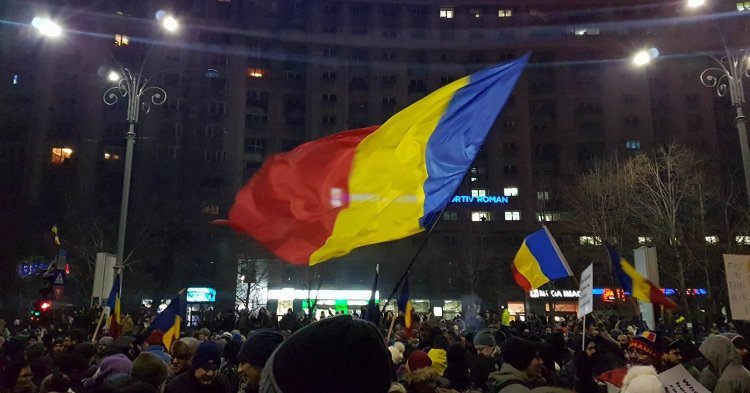He was not an uneducated man – he had made it very clear that he worked as an engineer for much of his life, most of it “before” (i.e. before 1989). In the autumn of 2014, when fate put him before me in a crowded Bucharest park, he was retired, spending his days as a pensioner. He found me reading a book and once he learned that I was a student in political science he proceeded to engulf me in his conspiracy theories regarding all things political, the same way I imagine a hypochondriac would assail a novice doctor.
“In the end, it’s Germany ruling Europe, and they’re using our youth as a cheap workforce. Basescu (the president at the time) knows this all too well, he’s in on it. That’s why he’s untouchable – he made a deal with them and the Americans. And you know, Merkel is his mistress,” the old man said, smirking in a sly way, as if he was dosing out some hidden but undeniable knowledge.
That December, however, Romanians everywhere chose liberal Klaus Iohannis, an ethnic German, as their president. The presidential campaign had been dirty, with the ruling Social Democrats (PSD) arguing that because Iohannis was “not Romanian, Orthodox or a parent,” he was unfit to be president. Pharaonic displays of power and popularity characterised their candidate, the Prime Minister at the time, Victor Ponta, who had been generous with social payments to the population, promising raises left and right, along with the traditional rivers of gold.
Fast-forward five years later – Romania has been one of the few quiet countries of Eastern Europe, when compared to Orban’s Hungary or Kaczynski’s Poland. No open Eurosceptics are in sight, as politicians from all parliamentary parties clamour around the European Union and its funds. The Social Democrats still govern, after winning 45% of votes in the 2016 parliamentary elections.
Aside from the sphere of political competition, Romania has been the scene of a brutal police crackdown. On the 10th of August 2018, the Romanian diaspora and other protestors joined together in Piata Victoriei – as they had ever since January 2017, protesting government corruption.
Only that on this day, the gendarmes, Romania’s militarized anti-riot police, had orders to break up the protest – and so they did, with indiscriminate use of tear gas and violence, all the while hiding the numbers on their helmets which could have been used to identify them later. With the help of police officers brought from all over the southern regions of the country, violence was arbitrarily and unnecessarily used against those who came home for just a few days to utter their dissatisfaction towards the direction in which the country was heading.
Romania was welcoming its sons and daughters back home by literally trampling on them.
Hundreds of complaints followed. Yet, no one was found guilty. No one was imprisoned, fired or demoted. Instead, those who orchestrated the crackdown were promoted or moved to other profitable positions and the prosecutors who dared look into the way the protest was handled by the authorities came under investigation themselves. The lack of an appropriate reaction from the part of the Romanian government prompted the United Nations to start its own investigation, following pleas from Romanian NGOs.
Other events unfolded:
- The chief prosecutor of the National Anti-Corruption Directorate (DNA), Laura Codruta Kovesi, was fired at the orders of the PSD and ALDE-backed Minister of Justice.
- Anti-fraud officers raided the offices of the independent investigative journalism platform Rise Project, just as it happened to be looking into files on Liviu Dragnea, leader of PSD.
- Those who dared protest were ignored or fined – sometimes in a way revealing of the true intent of the police, like a deaf-mute protester who was fined for shouting anti-government slogans.
- As deputies from his own party started to depart to the party of the former PM turned opposition party leader Victor Ponta, Pro Romania, Dragnea accused the interference of secret agents hidden in the press, in his party and in other public institutions – even though his party has been governing with a single one-year interruption ever since late 2012.
- Stricter rules on the financing of NGOs were set to intimidate all possible criticism.
- Government officials scolded Romanian MEPs who dared bring the misdoings of the former before the European Parliament and Commission, branding them inside the country as traitors, all the while PM Viorica Dancila makes use of a doubled type of discourse – vowing to protect rights, freedoms and the rule of law in Brussels while doing everything to undermine them at home.
- Since January 2017, when the PSD government pushed onwards with Emergency Ordinance no. 13, which set a threshold of 200.000 lei (about 42.000 euro) for abuse of office, numerous changes to criminal law have been passed – all in favor of those prosecuted or convicted.
- The president, an opponent of the government, has been systematically stripped of powers, such as his role in naming the heads of the High Court or his ability to refuse appointments of prosecutors and judges.
- Hierarchical control was reimposed on prosecutors, with the politically-appointed minister of justice at the top.
- A special section charged solely with the investigation of magistrates – prosecutors and judges – was also formed.
- The Ombudsman, supposedly a defender of the Romanian people, remains silent, a silence that is awarded by the government with a generous salary combined with an equally impressive pension.
- Negligence in office was also fully decriminalised and the crime of giving false statements was partially decriminalised. Criminal deeds not prosecuted within 3 years can no longer be investigated and conflict of interest was partially decriminalised.
On October 3rd of last year, the European Parliament voted – 473 to 151, with 40 abstentions – a resolution condemning new legislation drafted by the Romanian parliament, arguing that it is affecting the independence of the judiciary.
But the PSD-ALDE government pressed on, despite warnings from the EU institutions, GRECO or the Venice Commission. Citing overcrowded prisons, they passed a law allowing for the early release of convicts – over 14,000 releases, many of them going on to commit theft, assault or murder again.
But the man who sat me down on a bench in 2014 and told me that Merkel was controlling Romania in order to use its workforce and natural resources would never hear of all of the above. If he did, he would probably dismiss them as unimportant events blown out of proportion by George Soros or some other evil mastermind and his cronies, all set to destroy this country in particular and steal his meager pension.
No, he would focus on the novel scenarios which embroiled the current president, another opponent of the government, in a creative string of conspiracies involving Nazis, child-stealers, organ-thieves, and obscure intelligence officers.
Through its elderly population, the Romanian democracy remains trapped in the past. Through its youth, it exhibits a chronic lack of hope that things will get better.
At the same time, the flag featuring 12 gold stars on a blue background keeps waving at every anti-corruption protest, a testament of the direction from which Romanians expect aid.







Follow the comments: |
|
